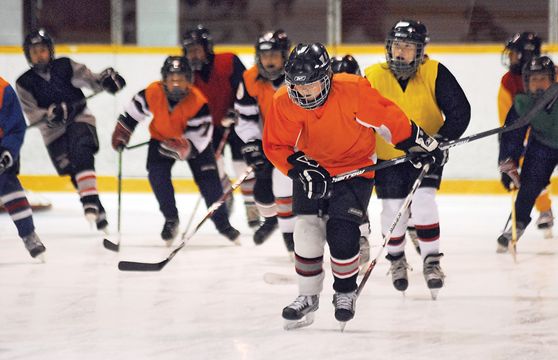December 6, 2023

In young children, fostering a healthy spirit of competition can be a tricky task. It is a fine line between being overly competitive and not finding the motivation to compete when playing sports. This is not just an issue for hockey players, it is something that needs to be approached carefully for young athletes of any sport.
So how can we ensure that our kids enjoy their sports with a sense of competition without going overboard? As with anything it takes a lot of encouragement and patience. It also takes support from both parents and coaches. Let’s take a look at some strategies we can incorporate to foster healthy competitiveness from a young age.
Positive Reinforcement
Any parent knows that positive reinforcement is a great way to support your child while also building their confidence. The same sentiment applies when it comes to sports as well. This includes helping your child define some critical aspects of being competitive. What are they playing for? What is the ultimate goal of competing in sports? And how to deal with losing or being unsuccessful.
Where does your positive reinforcement come in? So many children are taught that winning is the only goal in sports. While this might be true to an extent, there are also other reasons that will likely resonate more with your child. For example, being around their friends. The social aspect of sports is often overlooked and is such an important part of early childhood development. Learning that losing is okay and an acceptable part of competition and sports. If your children do not learn this early, it will be a more difficult realization when they are older.
Define What Success is
This goes hand in hand with your positive reinforcement. How do we teach our children what success actually is when it comes to sports? One way is to associate success with effort rather than winning or scoring goals. It is easy to associate having a good game with your team winning, and often this is true. But how do you do this when the team loses the game?
Encourage your child that they played well and point out the positives that you saw. This can be anything from scoring a goal to a nice pass or even just executing a nice hockey stop on the ice. If you can associate these accomplishments with having a good game, then winning will be the cherry on top. You will notice that your child will probably try hard in every game and not just the ones that they are winning. This means being competitive in every situation!
Learn From Others, But Don’t Compare
It is very common for children to compare themselves to others, for better or for worse. Often they can be hard on themselves for not scoring as many goals or not being as fast of a skater. As a parent, we need to help them learn to compete with others, but most importantly, compete with themselves. The best way to ensure personal development is to measure personal milestones rather than compare them to other players.
How can you foster this type of self-competition? Again, work on establishing those personal goals for each game. Take baby steps: did you get a shot on goal? Okay, next game let’s aim for two shots on goal. The more you shoot the puck, the more the goals will come! Success breeds success. Start small and take incremental steps for how your child can improve their own skills. The more you are able to help them achieve each goal, the more they will be determined to play hard and learn a healthier form of competition.
Reign the Competitiveness in
So far this article has discussed competitiveness as if it were a negative thing. This is not what we are trying to portray. In fact, competitiveness can be a positive trait and can even be considered natural. The issue with many children is finding that balance and the right type of competitiveness. If they are over-competitive, it could manifest in aggressiveness on the ice or even an unhealthy team atmosphere. If they aren’t competitive enough, there is a chance they will not enjoy playing as much as you would hope.
It is critical to find that right balance when you are trying to foster competitiveness in your child. If you find that your child is overcompetitive and being hard on themselves or others, reign it in. Do not over-celebrate wins and find the positives in losses. It is a difficult balance to find, but when you do, both you and your child will find sports to be a much more rewarding experience.
Keep them Engaged!
The last thing you want to do is turn your kids off of hockey or sports altogether. It is important to keep them engaged and enjoying the sport, so do not feel you need to overly focus on their level of competitiveness. After all, losing interest in sports altogether will devoid them of valuable social skills and physical development. It could also potentially alter how they approach competition in other areas of life. Let’s try our best to keep them engaged while also balancing their competitiveness. As with most things in parenting, it is a fine line we must walk!
Conclusion
As you can see, finding that balance is a difficult task for any parent. Not only do we have to ensure our children continue to enjoy their sports, but also reign in our natural instinct to want to see our child be the best. Remember that they can succeed while also having a healthy competitive spirit!
